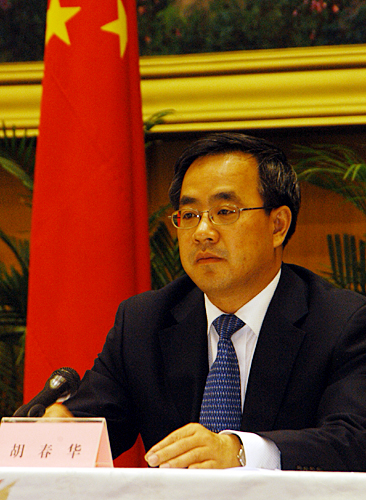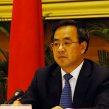
Sixth-Generation Leaders Promoted to Top Party Positions
Publication: China Brief Volume: 9 Issue: 24
By:

In the first major re-shuffle at the party provincial committee level following the 17th Chinese Communist Party (CCP) Congress in 2007, several changes have caught the attention of Chinese leadership-watchers. While the personnel changes, which were announced on November 30, affected six out of the 31 provincial committees, two changes stood out in particular. Hebei Provincial Governor Hu Chunhua (46) and Agriculture Minister Sun Zhengcai (46) were elevated to provincial party-secretary of the Inner Mongolia Autonomous Region and Jilin Province respectively (Xinhua News Agency, November 30; Ming Pao, December 1).
Prior to his promotion as party-secretary, Hu Chunhua’s (no relation to Hu Jintao) portfolio included serving as chief of the Communist Youth League (CYL), an affiliation that begs close ties to President Hu Jintao—the ringleader of the CYL faction. Moreover, he spent nearly 17 years in the Tibet Autonomous Regions (TAR) that included a tour as the region’s first vice-party secretary in 2006, which earned him the nickname "Little Hu [Jintao]" in the media (United Daily News, November 30; Ming Pao, December 1; The Straits Times, December 1).
Sun Zhengcai, a native of Shandong Province, earned his Ph.D. in agriculture from China Agricultural University. Sun was selected to serve as the agriculture minister in late 2006, which made him the country’s youngest ministerial-level official at the tender age of 43 years old. Sun also used to be head of Shunyi district in Beijing and served as secretary-general of the Beijing CCP municipal committee (Ming Pao, December 1; Ta Kungpao, December 1).
The meteoric ascendance of Hu and Sun, who were both born in the 1960s, marks the first time that party members of the so-called "sixth generation," who range from 42 to 49 in age, were promoted to the ranks of party-secretary at the provincial levels. This move positions Hu and Sun ahead of their peers in becoming the core of the "sixth-generation" of Chinese leaders. Indeed, Hu and Sun were both featured in an issue of the official journal Global Personalities, which shined the spotlight on five "sixth-generation" politicians (See Willy Lam, "Hu Jintao Picks Core Sixth-Generation Leaders," May 15). Interestingly, Hu and Sun also represent different factions among the rising stars of cadres. Hu with his CYL background is deeply rooted in the President Hu-led tuan pai (CYL faction), and Sun, who had won accolades from Premier Wen Jiabao for his competence in office, is identified more with the "elitist" group spearheaded by Vice President Xi Jinping—even though Sun is not a "princeling."
President Hu has apparently been trying to promote a corps of young cadres up the ranks in order to consolidate the "sixth-generation" leadership in recent years—a practice handed down by the late patriarch, Deng Xiaoping—and the latest personnel shuffle may represent Hu’s attempts at staging the aftermath of the 18th Party Congress in 2012 when Hu and Wen are scheduled to step down (Sina.com.hk, December 1). Some media reports have even suggested that the personnel changes were made in preparation for the "sixth-generation" leaders coming of age at the 19th Party Congress, which will be held in 2017—effectively laying the foundation for the ruling coalition that will govern following the 2017 conclave and in the "post-Xi Jinping era" after 2022 (United Daily News [Taiwan], November 30).
Another notable characteristic found in this raft of personnel changes was an emphasis on transferring the “team leader” (yibashou) between the different provincial committees: From Hebei to Inner Mongolia, Jilin to Liaoning (vice-versa) and Fujian to Henan. These personnel arrangements appear in line with Deng’s dictum that senior officials in party units should hail from “the five lakes and four seas.” From the central leadership’s perspective, these movements of top party officials may also serve as a bridge between different provincial regions and at the same time strengthen the central authorities’ control over the local branches. According to Huang Zhongqing, the director for the Beijing bureau of Nanhwa Morning Paper, the contradiction between the central and local government has become wider since Deng’s economic reforms. The major problem lies in a growing divide between local interests and comprehensive economic development. Moreover, Huang pointed out that the plague of corruption among party officials has grown more severe, and even though routinely changing personnel cannot root out corruption, it can at least impede the development of a patron-client relationship in politics (BBC [Chinese], December 1).
The five changes at the provincial party-chief level also include former Fujian Provincial Party-Secretary Lu Zhangong, who was assigned to serve as party-secretary at the Henan Provincial committee, and replaced by the party’s only female party chief in 20 years, Sun Chunlan. Sun served as party chief of the All-China Federation of Trade Unions. Additionally, former Jilin Provincial Party-Secretary Wang Min was assigned to serve as the party-secretary at the Liaoning Provincial committee, and will be replaced by Sun Zhengcai (Xinhua News Agency, November 30).





